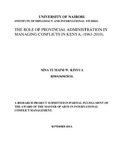| dc.description.abstract | The purpose of the research project was to investigate on the role of the provincial administration in managing conflicts in Kenya. The study was selected because of the maladaptive behavior commonly portrayed by the provincial administration where there has been a lack of an institutionalized framework and a co-ordinated approach to managing conflicts that can best be followed by the security forces. As a result, most actors engage on adhoc basis and with interventions that are reactionary in nature. The study looked at the following aspects:
What role has the provincial administration played in Kenya? This was in terms of the district commissioners if they knew on what conflict is and how well they were involved in managing the conflicts.
How have government policies and legislation affected conflict management in Kenya? This was meant to look at have these policies and regulations escalated or deescalated conflict interventions strategies by the provincial administration.
On clearly formulated polices and legislative laws that best address conflict management in Kenya.
What were the possible solutions given to the factors that were contributing to inefficiency into reactionary nature of conflict interventions by the security forces in Kenya?
The methods employed in this study are based on both primary and secondary data analysis. Interviews were conducted on five district commissioners who served in both president Moi‘s
regime and Kenyatta‘s regime to give a comparative analysis in chapter four. The study subjects consisted of 5 respondents. The researcher administered the questions personally.
After a critical examination of the findings from the interview it was discovered that the provincial administration as a department within the office of the president, has on many occasions been used to enforce executive decisions without question even when those orders were detrimental to the public interest. This upward accountability mechanism was exploited by the executive to suppress those opposed to its policies and programmes. Consequently in the eye of an ordinary Kenyan the history of the provincial administrators personifies repression, dictatorship, impunity and authoritarianism.
It was concluded that The future role of the PA can be deduced from clause 3 of Article 186, of the 2010 constitution which states that ―a function or power not assigned by this 2010 Constitution or national legislation to a county is a function or power of the national government‖ (Republic of Kenya – Constitution, 2010: Article 119). Given that the central government administrators (CGAs) at the district level will continue to supervise central government employees, they will need to learn how to manage a ―picket-fence‖ intergovernmental relationship.
―Picket-fence‖ intergovernmental relationships refer to an administrative arrangement between employees from different levels of government working on a similar policy issue, for example education specialists, who find it necessary to work together to solve a common problem. Although Article 186 may be prone to future contestation for its lack of specificity, it ideally strengthens the administrative arm of the central government on matters not assigned to county governments, however local those issues may be and unless the national assembly legislates
vii
otherwise. In the absence of such national legislation, the PAs will be vital in undertaking such matters on behalf of the central government.
For the latter to succeed, the PA must be structured as the nerve-centre for the coordination of issues between the central and county governments. The critical role played by PA officials cannot simply be wished away. Perhaps to the surprise of many, the role of a PA under the 2010 Constitution has been enhanced, made complex and indeed become more necessary than before.
With regard to its enhancement, the PA must serve as the nexus between the national government and the county governments‘ political class and their bureaucracies. PA officials will not only need to enforce national legislations, but they will also be required to understand, interpret and inform the central government of the implications of county legislations on national development goals and vice versa. | en |

